Have you ever wondered what are the essential ingredients you need to bake delicious homemade treats? Look no further! In this article, I will uncover the mystery and reveal the 7 basic baking ingredients that every baker should have in their pantry. These ingredients are the foundation of countless recipes, allowing you to create a wide variety of baked goods to satisfy any sweet tooth.
Before we dive into the specifics, let’s take a moment to appreciate the beauty of baking. The process of combining simple ingredients and transforming them into mouthwatering creations is nothing short of magic. And to ensure your baking endeavors are successful, it all starts with having the right ingredients at hand.
Key Takeaways:
- The 7 basic baking ingredients are flour, raising agent, sugar, salt, fats and dairy, add-ins, and water.
- Flour and raising agents provide structure and help baked goods rise.
- Sugar and salt enhance flavor and contribute to the overall taste of your treats.
- Fats and dairy add richness and moisture to your recipes.
- Add-ins like fruits, nuts, and flavorings bring a delightful twist to your baked treats.
Now that we have a sneak peek of what’s to come, let’s dive deeper into each of the 7 basic baking ingredients and discover their unique roles. Get ready to unleash your inner baker and create delectable masterpieces!
Understanding the Foundation: Flour and Raising Agents
Flour is the backbone of baking, providing structure and texture to your favorite treats. It is a pantry staple that comes in different varieties, such as all-purpose flour, cake flour, and bread flour. Each type of flour has a different protein content, which affects the texture and rise of baked goods. For example, all-purpose flour is versatile and commonly used in most recipes, while cake flour has a lower protein content, resulting in a tender and delicate crumb. Bread flour, on the other hand, has a higher protein content, making it ideal for yeast-based recipes that require a strong gluten structure.
Raising agents, such as baking soda and baking powder, are essential in creating light and fluffy baked goods. Baking soda is a leavening agent that reacts with acidic ingredients like buttermilk or vinegar, producing carbon dioxide and causing the batter or dough to rise. On the other hand, baking powder is a combination of baking soda, an acidic ingredient, and a stabilizer like cream of tartar. This means that baking powder can be used in recipes that do not contain acidic ingredients, as the acid is already included in the baking powder formula.
It’s important to note that the amount of raising agent used can greatly impact the final result of your baked goods. Too little can result in a dense texture, while too much can cause an overly airy or even a metallic taste. It’s always best to follow the recipe instructions precisely to achieve the desired outcome.
Adding the Sweetness: Sugar and Salt
Sugar and salt bring balance and sweetness to your baked creations. They are essential pantry staples that play a crucial role in enhancing the flavors and textures of your baked goods. While sugar adds sweetness, salt enhances the overall taste and helps to balance out the flavors.
When it comes to sugar, there are various types you can use in baking. Granulated sugar is the most common type, perfect for adding sweetness to cakes, cookies, and muffins. Brown sugar, with its molasses notes, adds a deeper flavor and moistness to baked goods like chocolate chip cookies and cinnamon rolls. Powdered sugar, also known as confectioners’ sugar, is often used for dusting or making frosting and glazes.
On the other hand, salt is not just about making your baked goods taste salty. It acts as a flavor enhancer, bringing out the natural flavors of other ingredients. Just a pinch of salt can balance the sweetness in a cake or cookie batter, making the flavors more pronounced. It also helps to strengthen the gluten structure in bread, providing structure and texture to the final product.
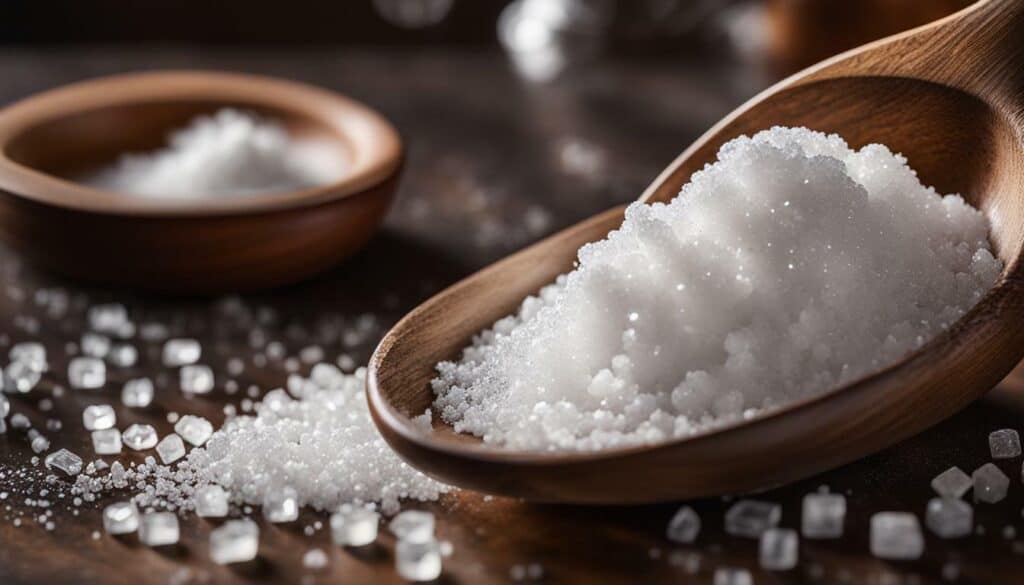
Now that you understand the importance of sugar and salt in baking, let’s take a look at a table summarizing their key roles:
| Sugar | Salt | |
|---|---|---|
| Role | Provides sweetness | Enhances flavors, balances sweetness |
| Types | Granulated, brown, powdered | Table salt, sea salt, kosher salt |
| Usage | Various baked goods, frosting, glazes | Various baked goods, bread |
As you can see, sugar and salt are more than just simple ingredients. They are essential components in your baking journey, adding depth and character to your favorite treats. So next time you’re in the kitchen, remember to reach for these baking pantry staples to create delightful and flavorful confections.
The Richness of Fats and Dairy
Fats and dairy products are key ingredients that add richness and flavor to your baked goods. They not only contribute to the texture but also enhance the overall taste of your creations. Let’s explore the different types of fats and dairy commonly used in baking.
One of the most versatile dairy products in baking is milk. It adds moisture and tenderness to your baked goods, creating a soft and creamy texture. Whether you use whole milk, low-fat milk, or buttermilk, each variation offers its own unique qualities, so choose the one that suits your recipe best.
Eggs are another essential ingredient that brings richness and structure to your baked treats. They act as binders, helping to hold the ingredients together and giving your creations a light and fluffy texture. When using eggs in your recipes, make sure to beat them well before incorporating them into the batter.
Butter is perhaps the most beloved fat used in baking. Its rich and creamy flavor adds a luxurious touch to cakes, cookies, and pastries. Whether you prefer salted or unsalted butter, it’s important to use it at the correct temperature for optimum results. Softened butter is easier to cream and incorporate into your batters, while melted butter can contribute to a different texture.
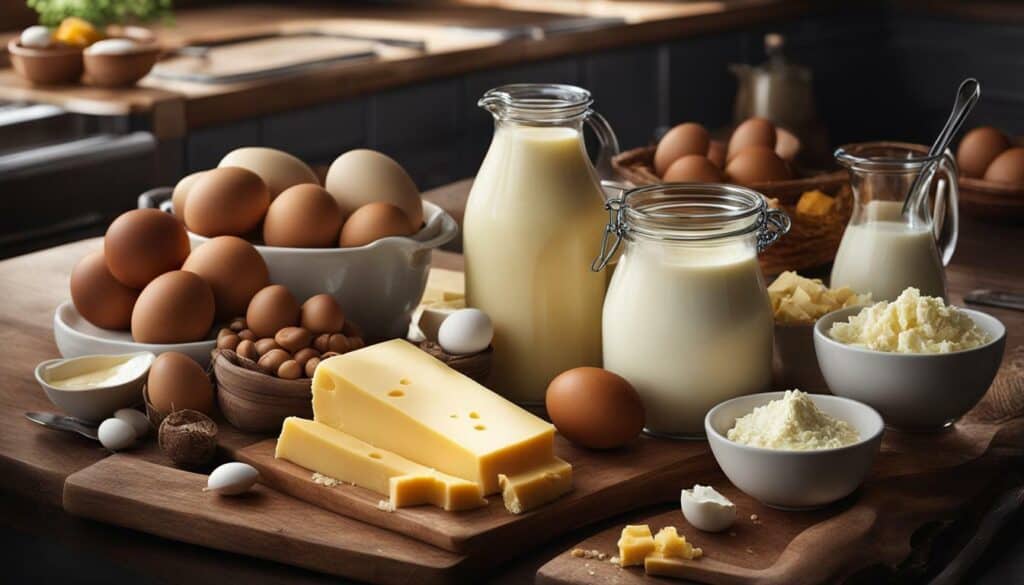
| Dairy Product | Role in Baking |
|---|---|
| Milk | Provides moisture and tenderness |
| Eggs | Act as binders and add structure |
| Butter | Offers richness and flavor |
By understanding the importance of fats and dairy in baking, you can elevate your recipes to new heights. Experiment with different types of milk, incorporate eggs into your batters, and savor the richness of butter. These ingredients will not only enhance the taste and texture of your baked goods but also bring joy to those indulging in your creations.
Getting Creative with Add-Ins
Adding extras like fruits, nuts, and flavorings can take your baking to the next level. These add-ins not only add delicious flavors but also provide interesting textures and visual appeal to your baked treats. Let’s explore some popular add-ins that can elevate your baking creations:
| Add-In | Description |
|---|---|
| Fruits | Fresh or dried fruits like berries, apples, bananas, and raisins add natural sweetness, moisture, and bursts of flavor to your baked goods. They are perfect for cakes, muffins, and breads. |
| Nuts | Walnuts, almonds, pecans, and other nuts bring a delightful crunch and nutty flavor to your recipes. They can be sprinkled on top of cakes, folded into cookie dough, or used as a filling in pastries. |
| Flavorings | Vanilla extract, almond extract, citrus zest, and spices like cinnamon and nutmeg add depth and complexity to your baked treats. These flavorings can be incorporated into batters, frostings, or sprinkled on top for a finishing touch. |
Experimenting with different combinations of add-ins can help you create unique and personalized baked goods. Whether you’re making a classic chocolate chip cookie with added walnuts or a zesty lemon cake with a hint of vanilla, these extras allow you to showcase your creativity and cater to your taste preferences. Remember to adjust your recipes accordingly when adding these ingredients, as they may affect the overall moisture and baking time.
So, don’t be afraid to get adventurous in the kitchen and explore the wide range of add-ins available. They are an excellent way to customize your baking and surprise your taste buds with delightful flavors and textures. Let your imagination run wild and enjoy the delightful results!
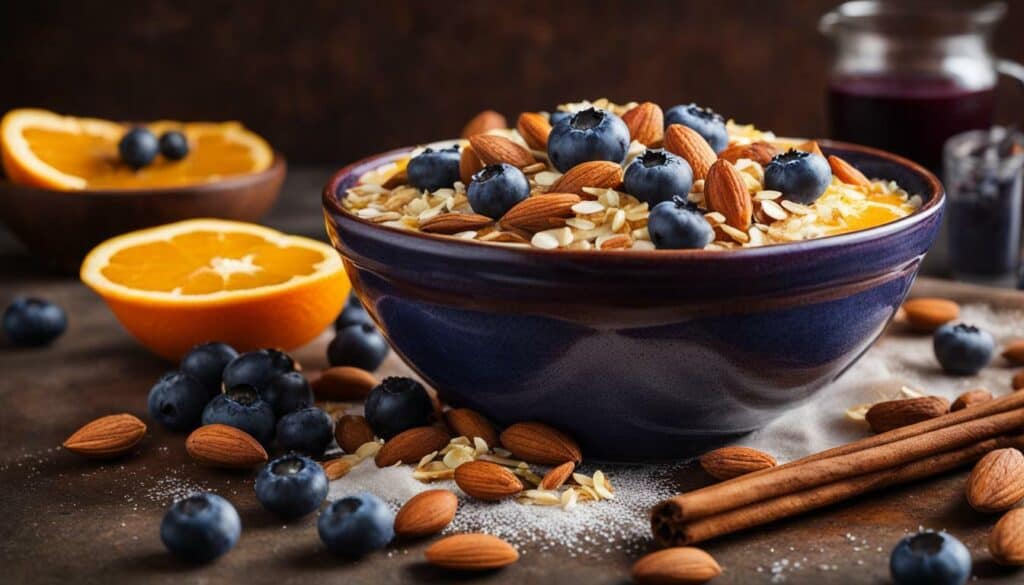
Water is a crucial ingredient that helps bring together all the other components in your baking recipes. It may seem simple, but its role in baking is essential. Without water, your doughs and batters would be dry and crumbly, resulting in less desirable baked goods.
In addition to providing moisture, water also helps activate other ingredients, such as yeast, to create the desired texture. It helps dissolve and distribute ingredients evenly, ensuring proper consistency and flavor throughout your baked treats.
To understand the importance of water in baking, let’s take a closer look at some examples. When making bread, water is necessary to activate the yeast, allowing the dough to rise. In cakes and cookies, water helps hydrate the dry ingredients and bind them together, resulting in a moist and tender crumb.
Tips for Using Water in Baking:
- Use cold water for pie crusts and biscuits to help create flakiness.
- When making bread, use warm water (around 110°F) to activate the yeast.
- For cakes and cookies, room temperature water is typically used to avoid temperature shock to the other ingredients.
Remember, the amount of water needed in a recipe can vary, so be sure to follow the instructions carefully. Adding too much water can result in a dense and soggy final product, while too little water can lead to dry and crumbly baked goods.
| Baking Supplies | Quantity |
|---|---|
| Flour | 2 cups |
| Baking soda | 1 teaspoon |
| Baking powder | 1 teaspoon |
| Sugar | 1 cup |
| Salt | 1/2 teaspoon |
| Butter | 1/2 cup |
| Eggs | 2 |
Must-Have Baking Supplies and Ingredients
Aside from the 7 basic baking ingredients, there are several additional supplies and ingredients that are essential for any baking enthusiast. These items can elevate your baking experience and allow you to create a wide variety of delicious treats. Let’s take a closer look at some must-have baking supplies and ingredients:
Baking Supplies
- Baking pans and trays: Having a variety of baking pans and trays in different sizes and shapes will allow you to bake everything from cookies to cakes with ease.
- Measuring tools: Accurate measurements are crucial in baking, so make sure you have measuring cups and spoons on hand.
- Mixing bowls: A set of mixing bowls in various sizes will make it easier to mix and prepare your ingredients.
- Spatulas and whisks: These tools are essential for mixing, folding, and scraping batter or dough.
- Parchment paper and baking mats: These can prevent sticking and make cleanup a breeze.
Key Ingredients
- Salt: Salt is not just for savory dishes; a pinch of salt enhances the flavors of baked goods.
- Butter: Butter adds richness and flavor to baked goods, especially when used in conjunction with other fats.
- Dairy products: Milk and cream cheese are common ingredients in many baked goods, providing moisture and tenderness.
- Sugar: Different types of sugar, such as granulated, brown, and powdered, add sweetness and contribute to the structure and texture of baked goods.
- Eggs: Eggs provide structure, moisture, and richness to baked goods, acting as binders and leavening agents.
- Cinnamon: This versatile spice adds warmth and depth of flavor to various baked treats.
- Vegetable oil: This neutral-flavored oil is often used in cakes and quick breads to keep them moist.
- Cacao powder and chocolate: These ingredients add a rich, chocolatey flavor to desserts like cakes, brownies, and cookies.
- Vanilla extract: Vanilla extract enhances the overall flavor of baked goods and adds aroma.
- Nuts: Various nuts, such as almonds, walnuts, and pecans, can add crunch, texture, and flavor to your baked treats.
- Dried fruits: Dried fruits like raisins, cranberries, and apricots can add natural sweetness and chewiness to baked goods.
Remember, having these supplies and ingredients on hand will make your baking adventures smooth and enjoyable. Experiment with different combinations and techniques to create your own signature baked treats!
| Category | Supplies | Ingredients |
|---|---|---|
| Baking Supplies | Baking pans and trays | Salt |
| Measuring tools | Butter | |
| Mixing bowls | Dairy products | |
| Spatulas and whisks | Sugar | |
| Parchment paper and baking mats | Eggs | |
| Key Ingredients | Cinnamon | |
| Vegetable oil | ||
| Cacao powder and chocolate | ||
| Vanilla extract | ||
| Nuts | ||
| Dried fruits |
Tips and Tricks for Baking Success
Want to take your baking skills to the next level? Here are some expert tips and tricks to help you achieve baking success.
1. Measure ingredients accurately: Baking is a science, and precise measurements are key to achieving the perfect texture and taste in your baked goods. Invest in a digital kitchen scale for precise measurements of dry ingredients like flour and sugar, as well as liquid ingredients like milk and oil.
2. Preheat your oven: Always preheat your oven to the specified temperature before placing your baking pans inside. This ensures even heat distribution and consistent baking results.
3. Use room temperature ingredients: Many recipes call for room temperature eggs, butter, and dairy products. Allowing these ingredients to come to room temperature before use ensures proper emulsification, resulting in lighter and airier baked treats.
4. Sift dry ingredients: Sifting your dry ingredients, such as flour, baking powder, and cocoa powder, not only removes lumps but also aerates them. This leads to a lighter and more evenly textured baked good.
| Baking Tips | Baking Tricks |
|---|---|
| Use parchment paper or silicone baking mats to prevent sticking and ensure easy removal of baked goods. | Add a teaspoon of vinegar to your pie crust dough to make it extra flaky and tender. |
| Allow your baked goods to cool completely on a wire rack before storing or frosting them. This prevents condensation and sogginess. | For a moist and tender cake, substitute some of the oil or butter with applesauce or Greek yogurt. |
| When creaming butter and sugar, mix them together on low speed initially to prevent splattering. | To prevent cookie dough from spreading too much, chill it in the refrigerator for at least 30 minutes before baking. |
With these tips and tricks in your baking arsenal, you’ll be well on your way to creating delicious and impressive baked treats. Remember to have fun, experiment, and don’t be afraid to make mistakes. After all, baking is as much about the process as it is about the final result. Happy baking!
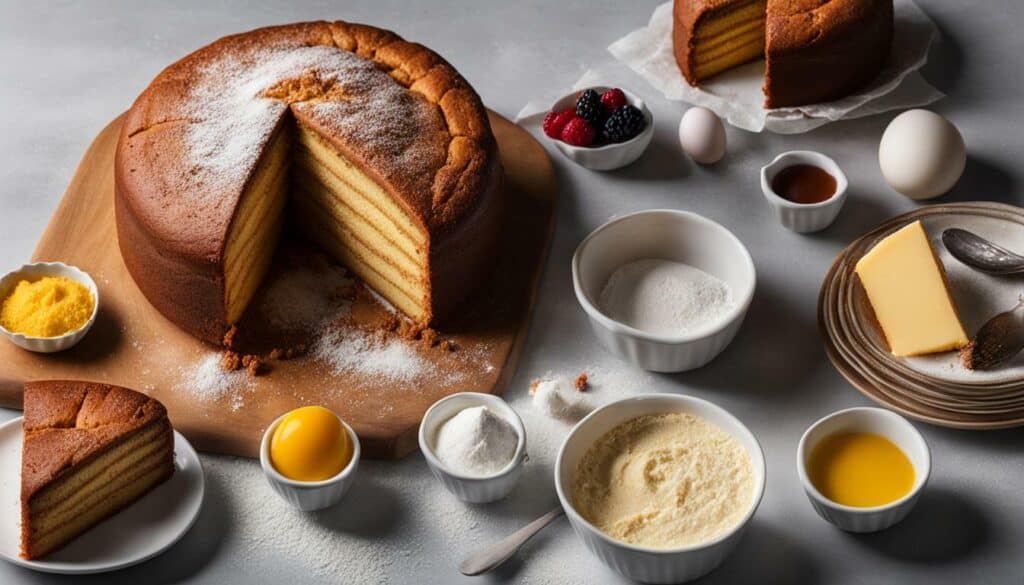
Armed with the knowledge of the 7 basic baking ingredients, you’re ready to create mouthwatering baked goods from scratch. Flour and raising agents provide the foundation for your recipes, ensuring proper structure and rise. Sugar and salt add sweetness and enhance flavors, while fats and dairy contribute richness and moisture. Add-ins like fruits, nuts, and flavorings can take your creations to the next level, and water is crucial for achieving the right consistency. With these ingredients and a few pantry staples like salt, butter, sugar, eggs, and spices, you’ll have everything you need to bake up delicious treats.
But it doesn’t stop there. To truly elevate your baking game, stock your pantry with additional ingredients like cacao powder, chocolate, vanilla extract, nuts, and dried fruits. These ingredients can add depth and complexity to your recipes, allowing you to unleash your creativity and experiment with different flavors and textures.
Remember, success in baking is not just about the ingredients you use, but also the tips and tricks you employ. Pay attention to measurements, preheat your oven, and follow recipes carefully. Don’t be afraid to try new techniques and recipes, and don’t get discouraged if things don’t turn out perfectly the first time. Baking is a skill that improves with practice, so keep experimenting and learning from your experiences.
So, whether you’re a seasoned baker or just starting out, embrace the joy of baking and let your creativity shine. With the 7 basic baking ingredients as your foundation, and a dash of passion and imagination, the possibilities are endless. Happy baking!
FAQ
Q: What are the 7 basic baking ingredients?
A: The 7 basic baking ingredients are flour, raising agent (such as baking soda or baking powder), sugar, salt, fats and dairy (such as milk, eggs, and butter), add-ins (such as fruits, nuts, and flavorings), and water.
Q: What can I make with these ingredients?
A: These ingredients work together to create a variety of baked goods, including cakes, cookies, breads, and pastries.
Q: What other ingredients should I have on hand for baking?
A: Other helpful ingredients to have on hand include salt, butter, dairy products (such as milk and cream cheese), sugar (granulated, brown, and powdered), eggs, cinnamon, vegetable oil, cacao powder and chocolate, vanilla extract, nuts, and dried fruits. These ingredients play specific roles in adding flavor, texture, and structure to baked goods.
Q: Why is flour important in baking?
A: Flour provides the structure and texture in baked goods. Different types of flour, like all-purpose flour or cake flour, can yield different results in terms of crumb and texture.
Q: What do raising agents do in baking?
A: Raising agents, like baking soda or baking powder, help baked goods to rise by releasing carbon dioxide gas when combined with moisture and heat.
Q: How does sugar enhance baked goods?
A: Sugar adds sweetness to baked goods and also contributes to their browning and texture. It helps to tenderize the crumb and provides moisture for a moist and flavorful result.
Q: Why are fats and dairy important in baking?
A: Fats and dairy, such as milk, eggs, and butter, add richness, moisture, and flavor to baked goods. They contribute to a tender crumb and help to create a desirable texture.
Q: What can I add to my baked goods for extra flavor?
A: You can add various add-ins like fruits, nuts, and flavorings to enhance the flavor and texture of your baked treats. These can range from chocolate chips and dried cranberries to chopped walnuts and vanilla extract.
Q: Why is water important in baking?
A: Water is essential in baking as it helps to hydrate the dry ingredients and create the right consistency and texture in the dough or batter.
What are the Seven Basic Baking Ingredients?
The seven basic baking ingredients that form the foundation of countless sweet treats are flour, sugar, eggs, butter, baking powder, salt, and milk. These essential elements come together to create a variety of delectable desserts, from fluffy cakes to chewy cookies, ensuring that basic baking ingredients are a must-have for any baker’s pantry.

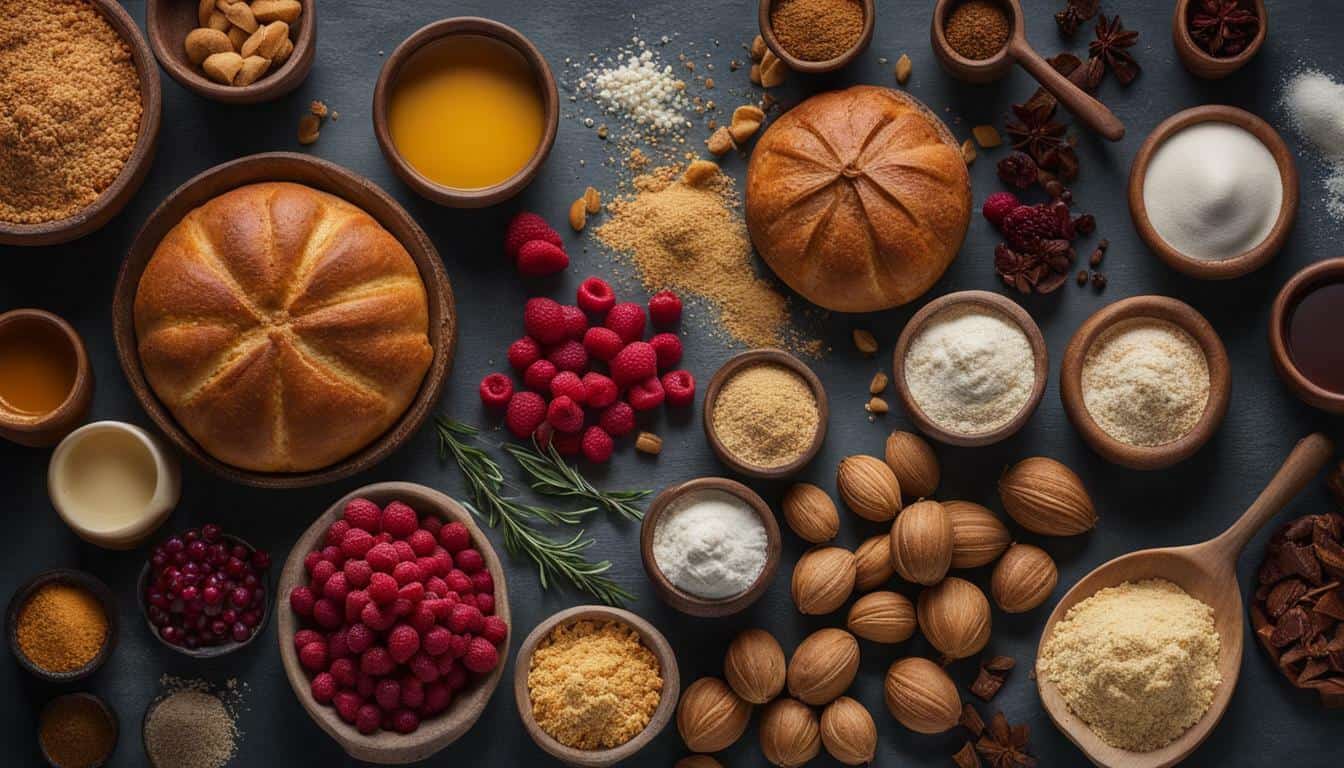
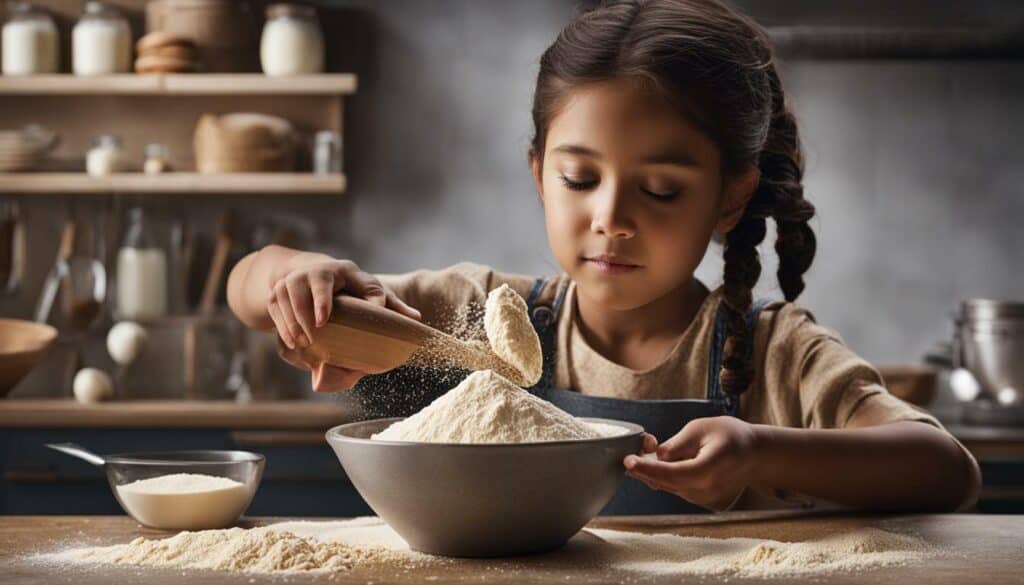
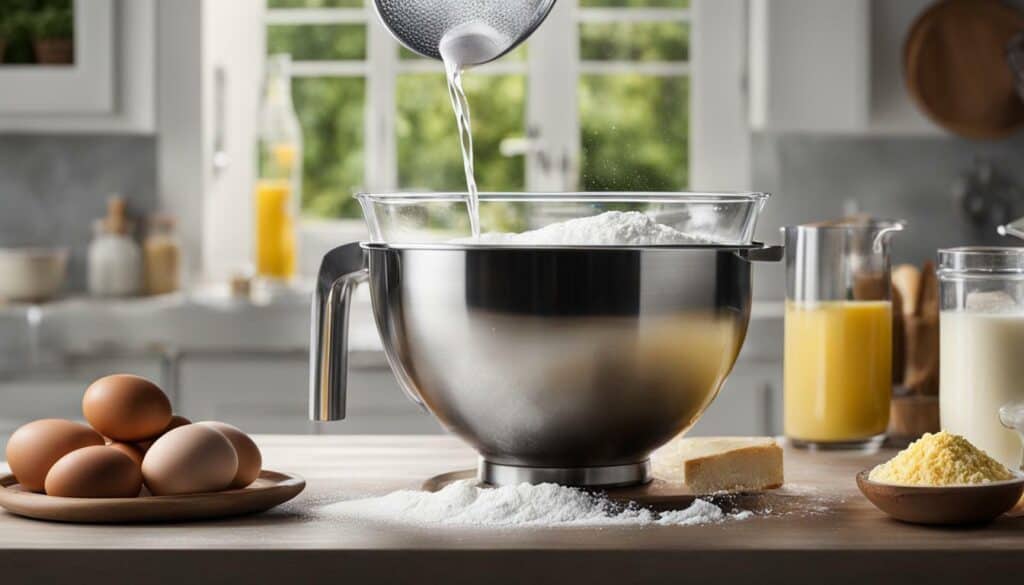
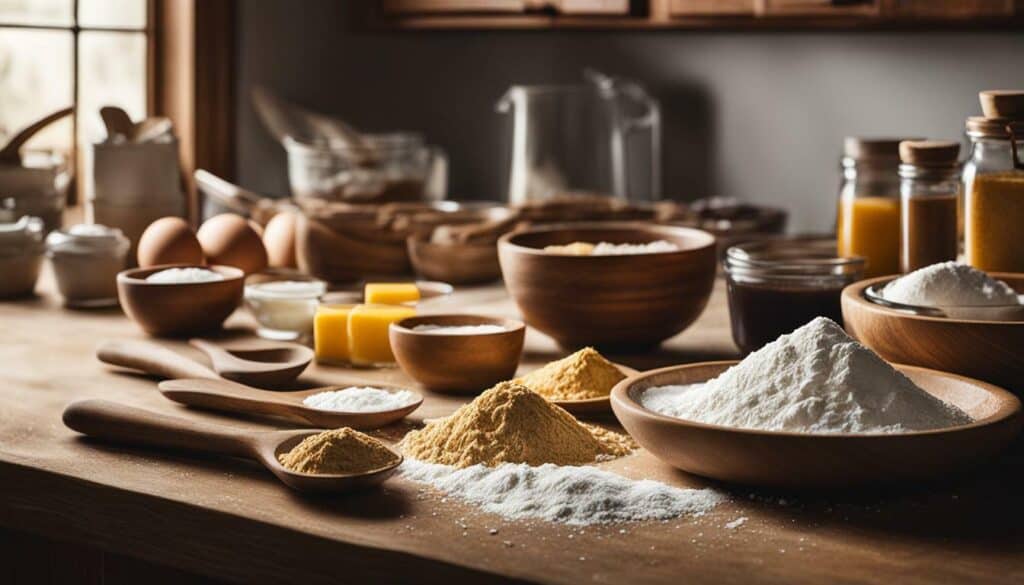



Leave a Reply